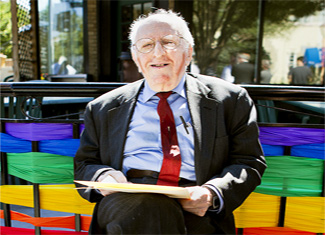
Frank Kameny started his career as a Harvard-trained astronomer working for the American government, but was fired for being gay in 1957. He has been fighting back for the last 54 years.
He is responsible for many important advances in gay and lesbian rights. These include the first gay civil rights case, the first public protests for gay and lesbian civil rights, the repeal of sodomy laws in the District of Columbia, the declassification of homosexuality as a mental illness by the American Psychiatric Association, and the first congressional campaign by an openly gay person. He continues his activism to this day.
Frank is also a veteran of the Second World War.
He has worked hard. As Frye writes, “There can be nothing effortless for the powerful imagination bursting its way out of a fallen world.”
His home has been designated a historical landmark, his early protest signs are now in the Smithsonian collection, and his contribution to civil rights history has been recognized by President Obama. But, at 85, having no income beyond a meagre Social Security check, Frank is now unable to pay his bills without help.
You can find out more about Frank here.
You can help him pay his bills by making a donation this month to Helping our Brothers and Sisters, a Washington D.C. micro-charity.
If the advances in civil rights that Frank has made possible have helped you or anyone you love, please give something back.

